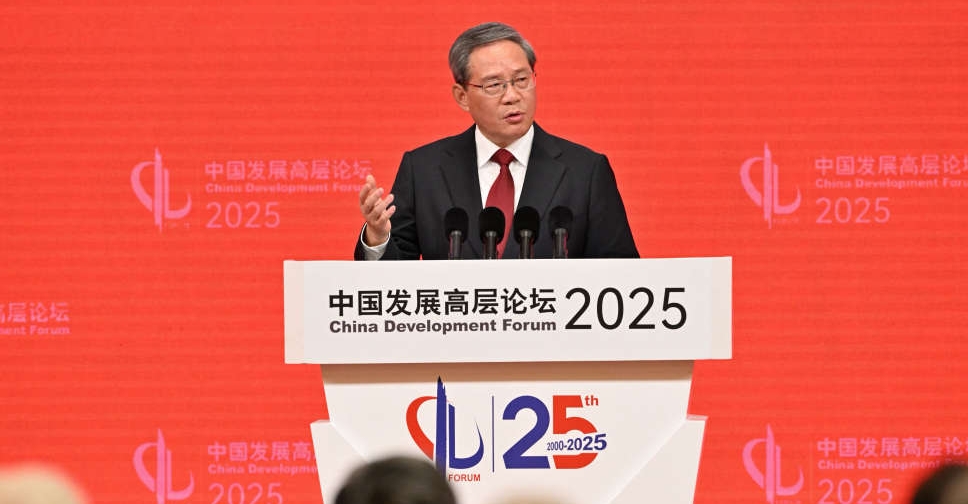
Chinese Premier Li Qiang urged countries to open their markets to combat "rising instability and uncertainty" at a business forum in Beijing on Sunday, as China braces for further U.S. tariffs.
"In today's increasingly fragmented world with rising instability and uncertainty, it is more necessary for countries to open up their markets and enterprises... to resist risks and challenges," Li told dozens of foreign CEOs and visiting U.S. Republican Senator Steve Daines at the China Development Forum, state media reported.
Foreign CEOs including Tim Cook of Apple, Cristiano Amon of Qualcomm, Pascal Soriot of AstraZeneca and Amin Nasser of Saudi Aramco are attending the forum on Sunday and Monday, and some are expected to meet President Xi Jinping on Friday, sources have told Reuters.
Beijing is keen to attract foreign investment at a time of heightened geopolitical tensions, as policymakers try to boost domestic consumption to offset fresh U.S. tariff headwinds.
"We will focus on combining policy intensification with stimulating market forces," Li said, according to a Xinhua report, without elaborating on specific stimulus measures.
"We will implement more active and promising macroeconomic policies, further intensify counter-cyclical adjustments, and introduce new incremental policies when necessary."
Li expressed hope that entrepreneurs would be "staunch defenders and promoters of globalisation" and "resist unilateralism and protectionism".
There were fewer American CEOs attending the summit than last year due to heightened geopolitical tensions between Beijing and Washington, according to one source.
Li met with Daines and seven other American CEOs on Sunday afternoon, which Daines billed as a chance for them to share their views of the business environment in China.
The Montana lawmaker, a strong supporter of President Donald Trump, met with Vice Premier He Lifeng on Saturday in the first visit to China by a U.S. politician since Trump took office in January.
Trump has announced a wave of fresh "reciprocal" tariffs to take effect on April 2, targeting countries with trade barriers on U.S. products, which could include China. He imposed 20% tariffs on Chinese exports this month, prompting China to retaliate with additional duties on American agricultural products.
The Trump administration is set to conclude a review by April 1 of Beijing's compliance with a "phase one" U.S.-China trade deal struck in his first term.
During the forum, Chinese economic policymaker Han Wenxiu vowed further efforts to deepen supply-side reforms and promote self-reliance in science and technology, according to state media.
In recent weeks, Chinese commerce ministry officials have met with at least a dozen executives from foreign firms including Brazilian mining giant Vale, Airbus, PepsiCo, Procter & Gamble, Honeywell, and Swire.
These meetings came as official data showed foreign direct investment last year plummeted the most since the 2008 global financial crisis.
China's State Council unveiled an action plan to attract foreign investment last week, which promised measures such as smoothing cross-border data transfers.
As China concluded its annual parliamentary session this month, the government vowed to "vigorously boost" consumption in an economy facing sluggish consumer demand and a protracted property crisis.
However, analysts have said policymakers will need to launch greater stimulus efforts if Beijing is caught up in a spiraling trade war with Washington this year.

 US starts collecting Trump's new 10% tariff
US starts collecting Trump's new 10% tariff
 Nasdaq set to confirm bear market as Trump tariffs trigger recession fears
Nasdaq set to confirm bear market as Trump tariffs trigger recession fears
 Dana Gas and Crescent Petroleum exceed 500M boe in Khor Mor field
Dana Gas and Crescent Petroleum exceed 500M boe in Khor Mor field
 China to impose tariffs of 34% on all US goods
China to impose tariffs of 34% on all US goods
 Shares bruised, dollar crumbles as Trump tariffs stir recession fears
Shares bruised, dollar crumbles as Trump tariffs stir recession fears




